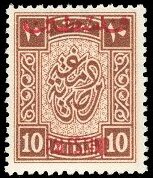Stamp: "Damgha masriya" (Egyptian tax) in Arabic calligraphy (Palestine, Egyptian Occ.- Revenue Stamps 1948)
"Damgha masriya" (Egyptian tax) in Arabic calligraphy (Palestine, Egyptian Occ.- Revenue Stamps 1948)
01 January (Palestine, Egyptian Occ.- Revenue Stamps ) within release Revenue goes into circulation Stamp "Damgha masriya" (Egyptian tax) in Arabic calligraphy face value 10 Egyptian millieme
| Stamp "Damgha masriya" (Egyptian tax) in Arabic calligraphy in catalogues | |
|---|---|
| Colnect codes: | Col: EG-PS R1948-03 |
Stamp is vertical format.
Egypt revenue stamp of 1939 overprinted "PALESTINE" in Arabic and English in redAlso in the issue Revenue:
- Stamp - "Damgha masriya" (Egyptian tax) in Arabic calligraphy face value 1;
- Stamp - "Damgha masriya" (Egyptian tax) in Arabic calligraphy face value 5;
- Stamp - "Damgha masriya" (Egyptian tax) in Arabic calligraphy face value 10;
- Stamp - "Damgha masriya" (Egyptian tax) in Arabic calligraphy face value 30;
- Stamp - "Damgha masriya" (Egyptian tax) in Arabic calligraphy face value 50;
- Stamp - "Damgha masriya" (Egyptian tax) in Arabic calligraphy face value 200;
Stamp "Damgha masriya" (Egyptian tax) in Arabic calligraphy it reflects the thematic directions:
A symbol is a mark, sign, or word that indicates, signifies, or is understood as representing an idea, object, or relationship. Symbols allow people to go beyond what is known or seen by creating linkages between otherwise very different concepts and experiences. All communication (and data processing) is achieved through the use of symbols. Symbols take the form of words, sounds, gestures, ideas, or visual images and are used to convey other ideas and beliefs. For example, a red octagon is a common symbol for "STOP"; on maps, blue lines often represent rivers; and a red rose often symbolizes love and compassion. Numerals are symbols for numbers; letters of an alphabet may be symbols for certain phonemes; and personal names are symbols representing individuals.

